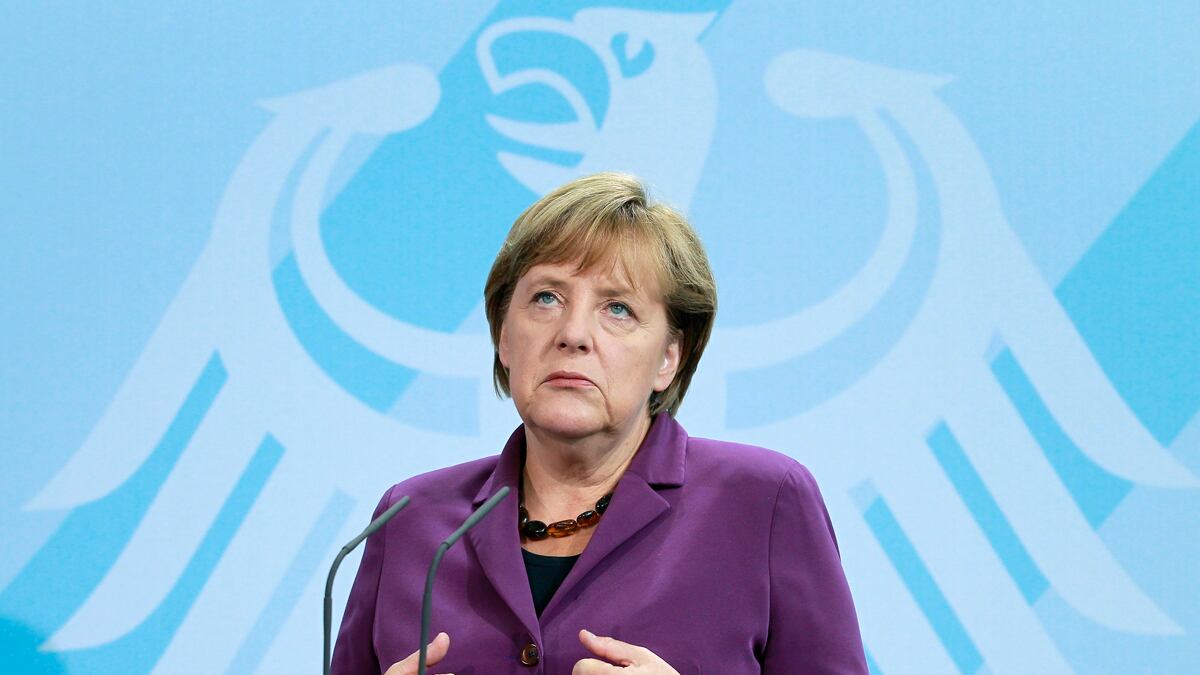Germany is having a Tea Party moment—and it’s about to cost the EU its soul.
Germans, who are champion savers and harbor memories of the horrendous inflation of the Weimar Republic, are infuriated by the improvidence of the Southern European states. They first voiced indignation at Germany’s approval of contributing $28 billion to an EU rescue fund in May 2010. All the old stereotypes about the lazy Latins in hot climates have been revived, with the added sting that they now want to be put permanently on the teutonic dole. Of course Germany, whose banks hold tens of billions in Greek debt, would be hit very hard by a default (as would France). And Germany can’t exclusively sell; BMWs and Mercedes to Chinese yuppies, it also needs a European market.
In early September, financial markets were reassured when the German Federal Constitutional Court rebuffed a lawsuit filed by a number of academics challenging Berlin’s actions to aid Greece. But the court’s ruling did state that the government must consult Parliament in the future, which hinders the ability of Angela Merkel and her coalition to respond quickly to any further crises. But the Greek crisis is already a reality—and the Germans are having at their southern neighbors full bore.

But perhaps the most painful stab-in-the-back for Merkel has come from her coalition partner, the classically liberal Free Democrats. Like the British Liberal Democrats, who have suffered at the polls by allying themselves with David Cameron’s Tories, the Free Democrats have watched as their poll numbers plummeted ever since they joined a coalition with Merkel. Now they’re aiming to distinguish themselves from Merkel’s Christian Democrats and to harness populist wrath over the euro.
So far, they’re doing a good job of it. As the Berlin daily Der Tagesspiegel reported, the party’s state legislator from Schleswig-Holstein, Juergen Koppelin, says that Greece resembles “an alcoholic that you urge to stop drinking and you simultaneously treat to a case of schnapps.” Parliamentarian Rainer Bruederle is calling for an “end to the horror.” Germany’s vice chancellor and economics minister Philip Roesler published an essay on Monday in the conservative newspaper Die Welt declaring that one solution to the crisis is “an orderly default for Greece, if the necessary instruments for it are available.”
Merkel was livid. Germany’s Iron Lady went on RBB Inforadio to chide Roesler and warned of a “domino effect.” “What we don’t need is instability in the financial markets,” she said. “The uncertainty is already great enough.” Finance Minister Wolfgang Schaeuble, who has been a longtime champion of the euro, is apparently preparing contingency plans should Athens declare bankruptcy. Meanwhile, on Tuesday, Roesler stood his ground, stating that Germans need “honest answers.”
But those answers may not satisfy skittish financial markets, which is why President Obama is pleading with European leaders to settle on a common financial policy. He’s sending Treasury Secretary Timothy Geithner to Wroclaw, Poland, on Friday to attend the EU finance ministers' meeting. We will continue to see weaknesses in the world economy, I think, so long as this issue is not resolved," Obama said. But Obama may be wasting his breath.
Long touted by political elites as the antidote to a resurgence of dangerous nationalist sentiment, the euro is having the opposite effect. It is ruthlessly pitting European nations against each other as they scramble to avoid financial contagion. As Greece faces the possibility of a default, as a second bailout wends it way through European parliaments, and as stock markets and the euro plunge, German Chancellor Angela Merkel’s coalition partner, the Free Democratic Party, is going rogue.
Perhaps Greece will be able to muddle through and Merkel will be able to quell the domestic rebellion that threatens her chancellorship. But don’t count on it. Bailout is a term that is even more reviled in Germany than in America. Aghast at the prospect of being saddled with further requests, Germany is becoming increasingly surly about helping its neighbors. Europe doesn’t just have a Greek problem. It also has a German one.





